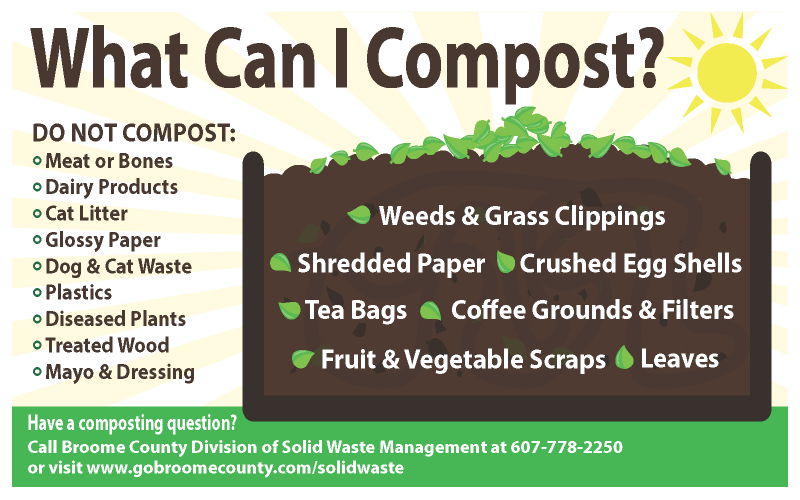Backyard composting is an effective way of recycling organic wastes such as leaves, grass and food scraps that are generated at home. Composting at home is easy and helps to keep waste out of our landfills.
4 Main Composting Ingredients
Nitrogen: Green materials such as yard waste, grass clippings, vegetable and fruit scraps (be sure to bury these deep in the pile)
Carbon: Brown, dry materials such as dry leaves, twigs, or straw should make up most of your compost. Be sure to chip any large/thick woody branches prior to composting. The Browns to Greens Ratio should be 3:1 by volume.
Water: Your compost pile should be moist similar to a wrung-out sponge. The moisture content to be about 40 to 60 percent. To test for moisture, grab a handful of compost and squeeze it, if only a few drops of water come out your moisture content is optimal. You can add water when turning a pile during dry weather if needed. If your pile is too moist make sure it is draining properly and place a cover on it to prevent rain/snow from adding any more to the pile.
Air: You want your pile to be well aerated to allow the beneficial microorganisms to break down the organic matter. A poorly aerated pile will have slow decomposition and a rotten odor. You want to turn or fluff your pile with a pitchfork or turning tool about once a week. Your well aerated pile should smell like earth and will be warm in the center.
What Can I Compost?
There are many materials you can compost. The following information sheet will provide some guidance to what materials are acceptable for composting and those materials it is generally recommended to omit for composting.
Fact sheet: What can I compost?
Beginner's Guide: Composting Brochure

Grass clippings can also be left on the lawn. They provide up to 25% of your lawn's fertilizer needs and help keep it greener and healthier!
The Broome County Landfill has Earth Machine Composters for sale year-round. The units sell for $45 (includes tax). They can be purchased at the Broome County Landfill located at 286 Knapp Rd., Binghamton, NY. For more information, please call 778-2250.
A new shipment of compost bins has arrived and bins are available at the landfill.
Composter Location Requirements
- Choose a level area with good drainage
- Choose a location that can be accessed in all seasons
- Avoid placing your compost fully under a tree’s canopy or move your bin annually to prevent root intrusion
- Avoid placing your pile directly on a property line or too close to a neighbor’s patio or window
Compost Trouble Shooting
For help trouble shooting your compost pile visit the following website:
Cornell University Cooperative Extension of Tompkins County – Composting Fact Sheets
Interested in more information on composting or vermicomposting?
For more information on composting or vermicomposting (worm bin composting) contact Abigail Pepples, Cornell Cooperative Extension Subject Educator, at ajp382@cornell.edu, or call 607.584.5021 ext. 139.
Explore the links below for more detailed information:

